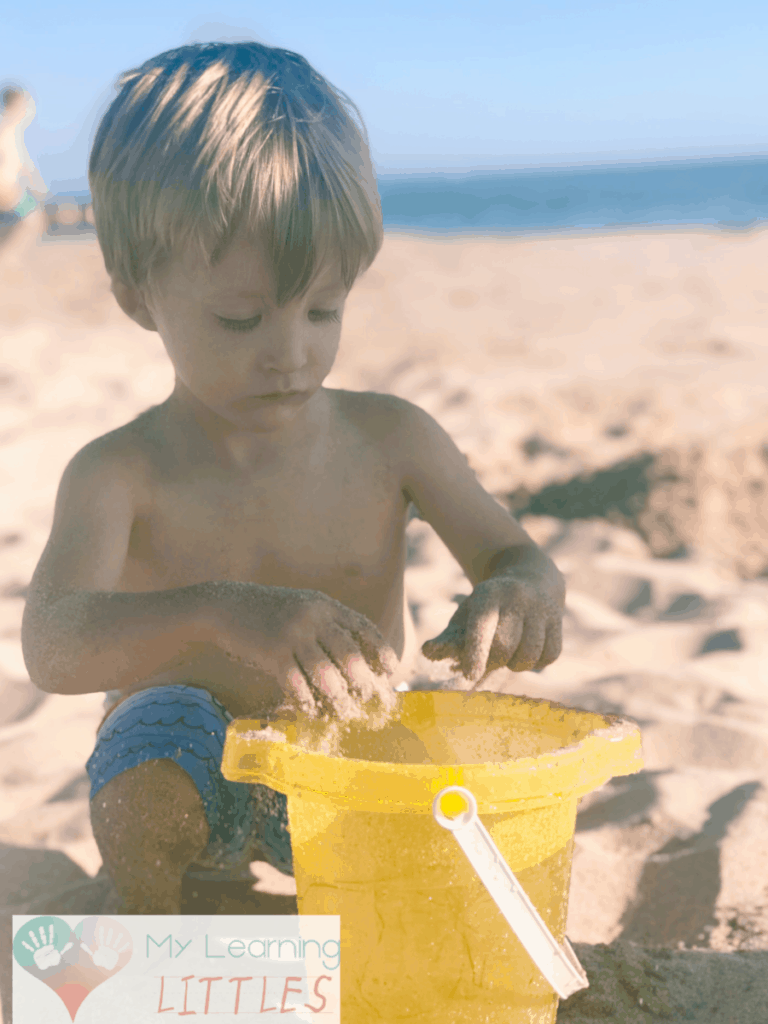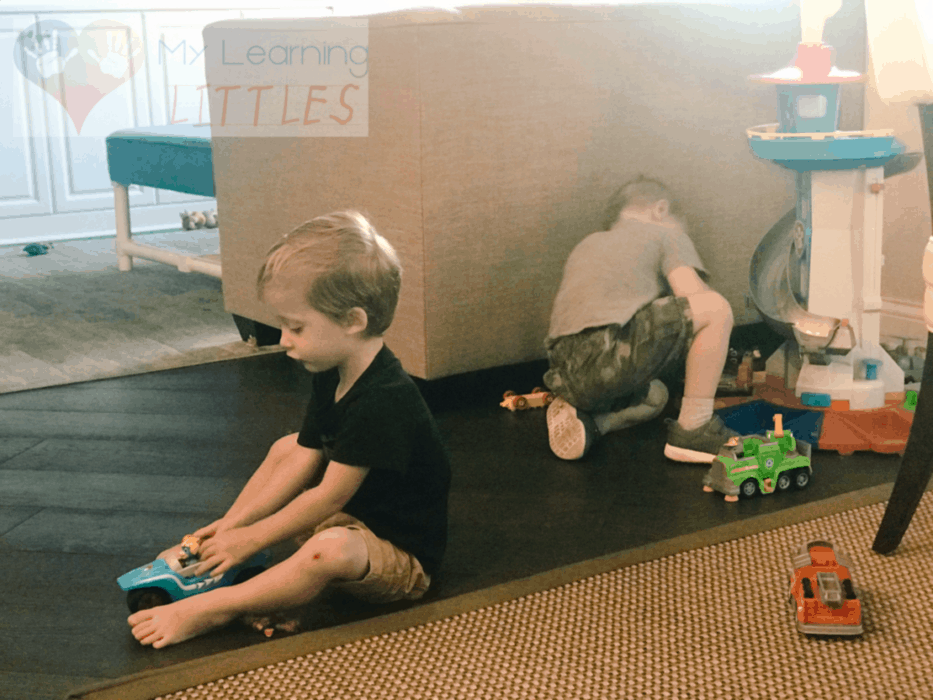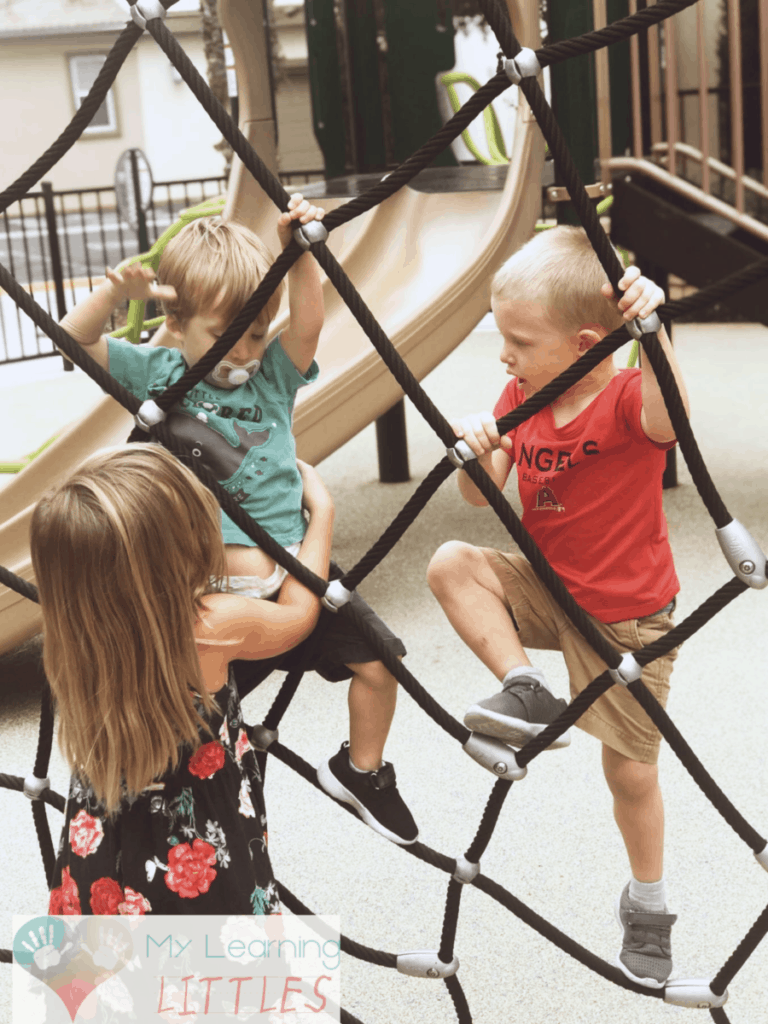I have three kids, all with their own personalities and preferences. Somedays they all get along well, other days they are picking on each other and bugging each other from the time they wake up until they go to bed.
How do you encourage children to play together?
Encourage children to develop through the stages of play; solo play, parallel play and group play. Around ages 4 and 5 social skills and sharing abilities will grow and children will begin cooperative play. Encourage games and activities that promote cooperative group play.
What is Play
Play is an opportunity for children to have fun, use their imaginations and creativity to make believe, explore and engage with others. Play can be done alone, it can be done with a friend or group of friends. Playing with others is a great way to build social relationships, build confidence, encourage teamwork, introduce competition and develop emotional awareness. We want that for our children, at least I know I do! Valuable life experiences can be learned through play and we can learn right along with our children. I know my kids love playing and are excited when myself or my husband can stop what we are doing and play with them for a while.
Play helps children move from being self focused to being mindful of others as they develop. They want to play with others and they need to be kind and care for others for a pleasant experience. With time, my children have seen that they need to share and be considerate of their siblings feelings for play to last a good amount of time. When one child gets upset play stops and someone gets in trouble. Good behavior and attitude gets more playtime from mom and dad as well. Hopefully this will encourage good behavior in the future.

There Are Three Stages of Play
There are three different ways kids can play.
- Solo play – self entertaining or play by alone.
- Parallel play – playing side by side with someone but not together.
- Group play – playing with others.
As children develop they learn to play in these three forms. Babies start off playing individually or solo play. They are learning about the world around them and playtime is usually discovery time as well. I have found as my children have gotten older they also come back to solo play frequently. My daughter will go off on her own and play with her dolls and want some space from her brothers to create her own scenarios and characters. Children can also be engaged in solo play when they are near others, but true solo play is when they don’t notice the other children around them.
My youngest is 2 and prefers parallel play at the moment. Parallel play is when children play near each other and like having someone close by, but still play individually. They want to be close to a friend while they play and may interact together but not sharing play spaces. My youngest son (2 years old) wants to play next to his cousin or brother but doesn’t want to share any of his toys with them. He wants to do his own thing but be adjacent to a friend playing because he loves that company. At times this can lead to fighting over toys because my 2 year old is trying to parallel play and my older children are trying to group play. They don’t always recognize this at first, and it has taken me some time to realize it as well. Typically after some explanation they understand what he wants. Setting up the kids to play with play-doh or coloring books is usually a good way for my kids to get some parallel play time in with less fighting.
Group play is when the children play with each other, one on one or in a group of three or more. Group play tends to follow social rules established by themselves or a supervising adult. My nephew is about to be three and is starting to enjoy group play. He is starting to understand sharing and when he shares a toy that person can play with him and make play more fun and imaginative. This is a skill that will come in handy in preschool because children will develop relationships and friends to play with. Around three and four is also when children want to play more interactively with adults they are around. My four year old loves to ask myself or my husband to play Paw Patrol with him, he gives us a few characters and he takes a few. Then he helps decide what play will look like and keep the rules of the playtime.

Different Types of Play
We discussed how kids play in regards to with or without others. There are also different types of play based on how they are playing.
- Physical play is when children are using gross motor skills to run, jump, play tag or sports. They are using physical activity and developing muscle strength. During physical play children learn how to use their bodies to start and stop and action, to balance and build strength to play longer and longer. Physical play can look like a game of tag, hide and seek, wrestling or jumping and flipping all over the furniture.
- Constructive play is when children are creating things, painting, coloring or playing with blocks and building. Creative play uses fine motor skills in play to take an object or material and make it into something new. During constructive play children are creating patterns, solving problems and practicing manipulating smaller objects to create and design. Creative play can look like building with LEGO’s, painting or drawing a picture for a loved one.
- Expressive play is when children learn to express feelings and emotions through play. Acting out as characters when playing house or using dolls and action figures as their characters and carrying on dialogue for them will help a child express feelings they may have experienced already. They will encounter new experiences while playing with others. New emotions may be discovered and your child will learn how to handle them in a social setting. For example learning to share can be frustrating, cause jealousy and sometimes tears. As they process sharing they will work through the emotions.
- Dramatic or fantasy play is when children use the imagination and create new worlds or scenarios when playing. Dramatic play stretches a child’s imagination when they can re-enact situations or scenes from shows they have watched. My kids love to do finger puppet shows behind the couch or re-enact events from the day with an audience. Kids don’t always need props for dramatic play, but adding costumes or household items can increase the play experience.
- Virtual or digital play is playing online games either solo or with others. Digital play is mostly viewed in a negative light because it can lower patience and increase frustration. Children don’t see each other face to face and don’t see how their negative actions can hurt another. Digital play promotes self and can damage caring for others. However it is important to show how your child can care for others in a digital world to prepare them for future social media encounters. Also some children can thrive working alone and learning in a digital environment with home school or distance learning. It is important to monitor digital play and keep children safe and in a pleasant environment.
- Cooperative play is the most advanced form of social play. Cooperative play is when children play with established rules and typically one leader. Children are most ready for cooperative play after some time in preschool or when they play with others frequently. This kind of play is organized by established rules that all children abide by. For example in sports, board games or building puzzles and all children play together to accomplish the goal. It’s a great way to develop social skills and rule following. Great games to play are Follow the Leader, Red Rover, Simon Says and team sports like Soccer, Baseball and others.
Benefits of Cooperative Play
Since I have three kids and two cousins that are regularly over at my house cooperative play is my main focus. I want these kiddos to all get along and play well together. I know arguments over toys and space are bound to happen, but as they develop cooperation with one another hopefully fighting won’t happen all the time and they can play well together. Through cooperative play children learn some beneficial skills:
- Cooperation
- Communication
- Empathy
- Trust
- Conflict Resolution
These are huge wants that I wish my children to have in the future. I hope that having siblings will be a great way for my children to grow in these areas. These are also great skills for adults to have. Most adults work with others from time to time and having these skills will help in future jobs and relationships.
Activities That Encourage Cooperative Play?
Here are a few examples of activities that encourage cooperative play. We try these some of activities frequently and I found a few new ones while researching for this post that we will be trying as well.
- Puzzles
- Building Forts
- Follow The Leader
- Creative or Art Projects
- Relay Races – we play these at the park
- Scavenger Hunts
- Team Games
- Building With Blocks or Legos
- Making Up a Dance/ Act Out a Scene
- Board Games
- Playing Cards
Allow children to play together with minimal management by yourself. Have them work out issues, communicate and play independently so they can grow their skills. Of course be on hand if they need help and be able to create ideas and opportunities for the kids to work together. This is something I need to work on to help my children cooperate and be empathetic. Often when fights break out I split the kids up, they really need new ideas to cooperate.
A few ideas to help them cooperate when they haven’t found an idea on their own are: Have one group of kids provide the blocks and the other do the building. Have one child work on one aspect of a painting and another do another part. Have one child set up the board game, both play and the other child clean up. Splitting up tasks shows them they need to communicate and work together.

Final Thoughts
Even once your child has mastered group cooperative play they may revert back to other forms, solo or parallel. That is totally acceptable and should be welcomed. Sometimes children need more solo time if they are introverted, or they may want company but want to do their own thing. Work on communication so your child can express that to another sibling. My daughter is introverted and likes to play solo, my son is extroverted and loves to play with her. Fighting can come from them not communicating needs properly.